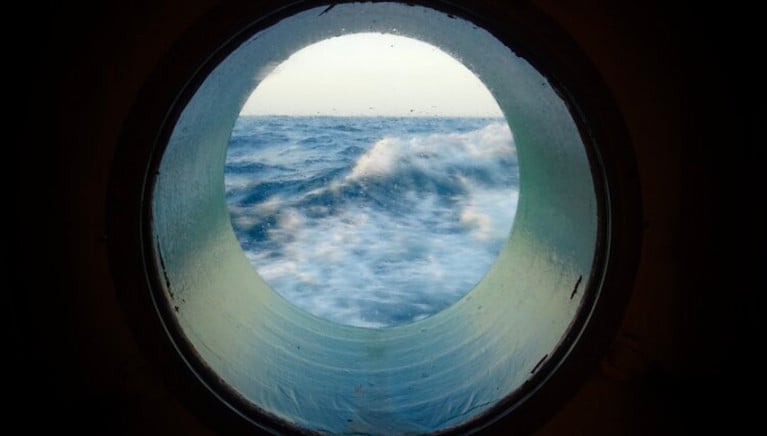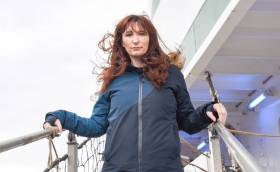Displaying items by tag: Aerial Sparks
Connect With The Ocean Wilderness Via Art Project ‘Aerial/Sparks’ On Inis Oírr & Online
An art project involving multiple collaborators and many years in the making will soon invite the public to connect, both in person and online, with one of the last unknown spaces on earth — the ocean wilderness.
Aerial/Sparks was created by artist Louise Manifold as part of Galway’s European Capital of Culture programme for 2020, as previously reported on Afloat.ie.
Manifold brought together seven artists, writers and composers from across Europe who produced a series of standalone artworks for exhibition and radio broadcast, inspired by their experiences on research expeditions aoard the Marine Institute’s RV Celtic Explorer.
Inis Oírr, the smallest of the Aran Islands and with a deep-rooted maritime culture, is the setting for the Aerial/Sparks Art Trail from 11-27 September.
At just 3km long by 3km wide, the island can easily be traversed by foot to discover sound works housed in a lighthouse, the local church, an old handball alley and Áras Éanna, Europe’s most westerly arts centre.
Louise Manifold created Aerial/Sparks to explore the potential of radio communication to reimagine our relationship with the ocean
‘Garden Galway’ — a virtual programme of events for Ars Electronica 2020, the world-renowned festival for art, technology and society — will accompany the main exhibition from 9-13 September, and will include a series of conversations between artists and marine science experts.
Manifold created Aerial/Sparks to explore the potential of radio communication to reimagine our relationship with the ocean.
And each artist’s experience of ocean and water masses around Ireland and Europe has informed the production of individual works for audio and radio listening.
Highlights include author Kevin Barry’s ‘Island Time’, a monologue in nine chapters for a lovelorn lighthouse keeper as he dreams of distant lands, sited at Inis Oírr Lighthouse.
German composer David Stalling’s ‘Palace of Ships’ was created in collaboration with seismologist Sergei Lebedev, while visual artist Carol Anne Connolly’s acoustic portrayals of the ocean were inspired by the use of sound waves in acoustic mapping to create visuals of the sea bed.
Meanwhile, UK radio artist Magz Hall’s ‘Waves of Resistance’ is a broadcast created in the spirit of transnationalism, relaying a message of peace, hope and unity across all borders.
Manifold says Inis Oírr is the ideal home for these sound works.
“I wanted to find a place more than a space for this presentation, a place rich with silence, where organic and human sound floats and carries through the wind,” she explains. “I wanted each work to be experienced in a way that would connect with and charge our experience of place.”
Aerial/Sparks is the result of a long-term collaboration with the Marine Institute. Since 2017, artists from Ireland, Germany, England and Slovenia have taken part in seven ocean surveys and a passage from Galway to Hamburg on the RV Celtic Explorer, which the institute says is one of the few marine research vessels with sonic capabilities.
‘An innovative opportunity for artists and marine scientists to connect and engage with the wider community’
These expeditions have opened up "unique opportunities to foster connections between art and science", the Marine Institute says, as artists work side-by-side with scientists monitoring our marine biodiversity and human impact on the ocean environment.
“The collaboration between the Marine Institute and Aerial/Sparks has created an innovative opportunity for artists and marine scientists to connect and engage with the wider community through mediums such as art and music,” says Marine Institute chief executive Dr Paul Connolly.
“Using the concept of sound and the sea is a unique way of showing how both the arts and sciences can come together to highlight the value, opportunities and societal benefits of our ocean.”
Marilyn Gaughan Reddan, head of programme at Galway European Capital of Culture 2020, added: "Aerial/Sparks is a notable example of what a European Capital of Culture can bolster — new ways of thinking, new ways of working, new conversations and new partnerships.”
The Inis Oírr exhibition will be open from 11-27 September, Wednesday to Sunday between 11am and 5pm. For more information visit aerialsparks.org
#MarineScience - As many as 12 artists, writers and musicians from Ireland and Europe have the opportunity to join expeditions on the research vessel RV Celtic Explorer and to work with marine scientists as part of an interdisciplinary art project for radio broadcast.
The three-year AerialSparks project will explore the potential of radio communication as a means to rethink our ocean wilderness as one of the last remaining unknowns.
AerialSparks has been created by artist Louise Manifold for Galway’s European Capital of Culture programme in 2020. Inspired by the concept of traditional broadcasting and the use of sonar and other technology for data collection, the project will result in a series of art works for radio.
Manifold, who previously worked with Galway schoolchildren on marine science and art projects, has commissioned artists from Ireland and Europe to develop new work based on their experiences of spending time at sea on research surveys carried out by the Marine Institute's research vessel, RV Celtic Explorer.
The Galway-born conceptual artist, currently on residency in Berlin, is keen to tap into the connections between radio as a communication and navigation tool, and discover how radio can make spaces visible to audiences.
“While at sea on the Explorer last year, I was extremely mindful of how radio can be listened to in solitude, yet bring people together providing a sense of togetherness,” she said. “It is amazing to think how early radio technology must have felt for many people bridging the distance of the ocean and bringing people together. Recognising the importance of technology, it continues to play a big part in how we understand the influences of the ocean.”
Taking part in the project are renowned artists David Stalling, Kennedy Brown, Carol Anne Connelly and Ailís Ní Riain, who will each spend up to two weeks at sea on the RV Celtic Explorer during scientific expeditions.
One of the surveys, overseen by Prof Andy Wheeler from UCC, includes monitoring deep-water coldwater corals reefs off the continental shelf, exploring the processes involved in understanding the coral habitats and sensitivity to climate change and human impacts.
The artists will have the opportunity to record data where advanced robotic technology and 3D visualisation tools will be used on the ROV Holland I at depths of 3,000m under the water.
Ireland’s offshore territory is 10 times the size of our land area, and marine research projects involving new technology help us learn more about the land under the sea, its geology and processes and how this impacts our lives.
Artists will also get to work with Prof Sergei Lebedev from the Dublin Institute for Advanced Studies (Dias), where research is being conducted looking at offshore earthquakes in the deepest parts of Ireland’s ocean.
With scientific equipment being deployed for the first time from the RV Celtic Explorer, including 18 ocean-bottom seismometers and an array of acoustic sensors, the survey will explore marine activity that can trigger undersea landslides.
Hannah Kiely, chief executive of Galway 2020, said of the project: “We are very excited about the waves of possibilities that the collaboration between arts and science presents particularly given the project’s focus on histories of the ocean voyage, maritime radio communication and how this might be felt and understood in a digital age. With our aim to be the first truly Virtual European Capital of Culture, digital is at the heart of our programme for Galway 2020.”
The ocean covers over 70 percent of the planet’s surface and with the advancement of marine technology, new discoveries are being made every day.
Marine Institute chief executive Dr Peter Heffernan added: “Aerial Sparks is an innovative opportunity for artists and marine scientists to learn new ways to connect and engage with the wider community.
“We are learning more about the ocean including new habitats being explored for the first time, new species being discovered, as well as the effects of climate change and understanding the impacts humans are having on the ocean.
“Therefore, increasing our awareness and narrative about the ocean is extremely important. Using the concept of sound and the sea is a unique way of showing how both the arts and sciences highlight the importance of exploration and curiosity.”
The Marine Institute is also hosting a series of lunchtime talks at its Galway headquarters for scientists, giving them the opportunity to meet artists working on the project, and to be introduced to their ideas, processes and future work for AerialSparks. For further information contact the research operations office at the Marine Institute.
AerialSparks is funded by the Arts Council of Ireland Project Awards, Galway 2020 and the Marine Institute.

























































